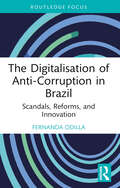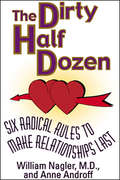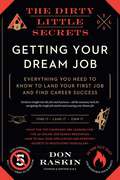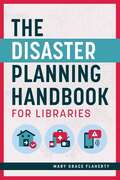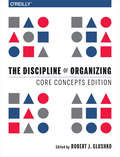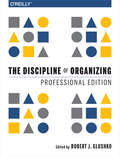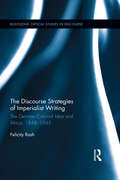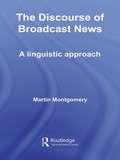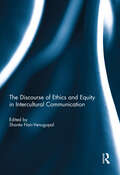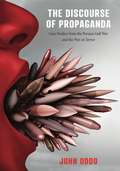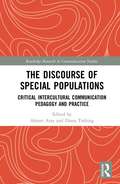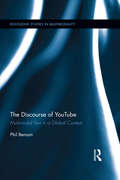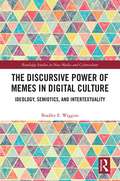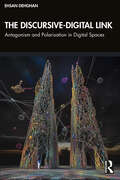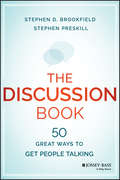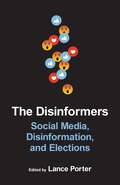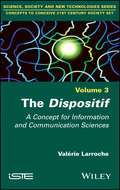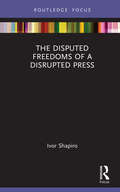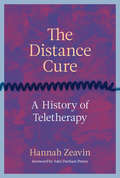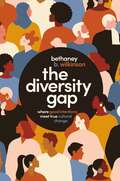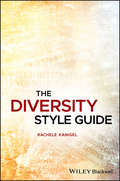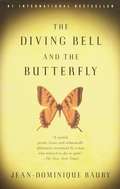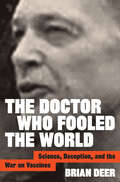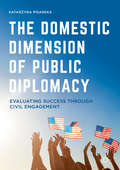- Table View
- List View
The Digitalisation of Anti-Corruption in Brazil: Scandals, Reforms, and Innovation (ISSN)
by Fernanda OdillaThis book investigates how digital technologies, such as social media and artificial intelligence, can contribute to combatting corruption in Brazil.Brazil, with its long history of scandals and abundant empirical data on digital media usage, serves as a perfect case study to trace the development of bottom-up and top-down digital anti-corruption technologies and their main features. This book highlights the connections between anti-corruption reforms and the rapid implementation of innovative solutions, primarily developed by tech-savvy public officials and citizens committed to anti-corruption efforts. The book draws on interviews with experts, activists and civil servants, as well as open-source materials and social media data to identify key actors, their practices, challenges and limitations of anti-corruption technologies. The result is a thorough analysis of the process of digitalisation of anti-corruption in Brazil, with a theoretical framework which can also be applied to other countries. The book introduces the concept of “integrity techies” to encompass social and political actors who develop and facilitate anti-corruption technologies, and discusses different outcomes and issues associated with digital innovation in anti-corruption.This book will be a key resource for students, researchers and practitioners interested in technologies and development in Brazil and Latin America, as well as corruption and anti-corruption studies more broadly.
The Dirty Half Dozen: Six Radical Rules to Make Relationships Last
by Anne Androff William NaglerSay goodbye to conventional wisdom and say hello to "The Dirty Half Dozen." Here is a fresh, iconoclastic set of rules for improving your relationship dramatically.<P>Based on thirty years of psychiatric literature, including over 1,000 studies on relationships, as well as the author's own personal relationship experience, this book shows how satisfying, long-term relationships are not about abstract concepts like romance, honesty, or intimacy. They are about something far more simple. <P>Learn the value of the little white lie, the destructive potential of the "petty" differences, the myth of the perfect relationship, the care and feeding of the happy, lasting relationship within tension-free surroundings, and other secrets that every couple needs to know.
The Dirty Little Secrets of Getting Your Dream Job
by Don RaskinDrawing on his extensive experience evaluating applicants for his marketing agency, and featuring stories based on real-life situations, sample cover letters, resumes, and straightforward advice, Don Raskin's The Dirty Little Secrets of Getting Your Dream Job offers all the necessary tools for navigating the tough job market and securing your dream job.Don Raskin owns and operates MME, an advertising and marketing agency in New York City. During his twenty-five years at the agency he has interviewed hundreds of new college graduates for positions within his agency and has placed a strong emphasis on entry-level recruitment for positions in creative, account management, traffic, and production. Raskin has also mentored countless students and their parents on best practices for the job search. Over the years, Raskin has kept exceptionally detailed notes on the interviews he has conducted, observing the good, the bad, the ridiculous, the irreverent. He also has a treasure trove of over-the-top cover letters, resumes, interviews, and post interview follow-ups he has conducted and received. Now, he wants to share all the wisdom and insider secrets he has gathered to help students and first-time job seekers find a job in this economy. Based on his remarkable expertise, Raskin's book provides exclusive insight into the job search process and lets readers in on all of the dirty little secrets to landing their first job--or a new one--and finding career success.
The Disaster Planning Handbook For Libraries
by Mary Grace FlahertyLibraries are in a unique position to aid communities during times of adversity, and this comprehensive handbook’s practical tools and expert guidance will help ensure that your library is thoroughly prepared for emergency response and recovery. Your library is a vital information hub and resource provider every single day, and that’s doubly true when calamity strikes. In fact, your library’s role as an “essential community function” during disasters is now encoded in U.S. law. Engaging as a partner in planning and preparedness will build much-needed community support should disaster strike, and even a basic plan will also save you time and stress later on. No matter where your library is in the disaster planning cycle, this handbook will make the process clearer and less daunting. You’ll get tools, activities, easy-to-adapt templates, and hands-on guidance on such topics as the six phases of disaster response; 15 first-hand accounts of library disaster planning or responses, helping you identify the library services most needed during a disaster; three essential factors that will shape the form of your disaster plan; preparing for hurricanes, tornadoes, fires, floods, and earthquakes; ideas for connecting with your community’s emergency response teams; federal government planning resources; pointers on working with state and local governments; a sample Memorandum of Understanding to outline mutual support for a speedier recovery; recommended courses and training, many of which are free; targeted advice for archives and special collections; sample building inspection checklists; and recommended games to help children and families prepare.
The Discipline of Organizing: Core Concepts Edition
by Robert J. GlushkoNote about this ebook: This ebook exploits many advanced capabilities with images, hypertext, and interactivity and is optimized for EPUB3-compliant book readers, especially Apple's iBooks and browser plugins. These features may not work on all ebook readers.We organize things. We organize information, information about things, and information about information. Organizing is a fundamental issue in many professional fields, but these fields have only limited agreement in how they approach problems of organizing and in what they seek as their solutions.The Discipline of Organizing synthesizes insights from library science, information science, computer science, cognitive science, systems analysis, business, and other disciplines to create an Organizing System for understanding organizing. This framework is robust and forward-looking, enabling effective sharing of insights and design patterns between disciplines that weren't possible before.Ideal as a textbook for undergraduates, the Core Concepts Edition includes new and revised content about the active resources of the "Internet of Things," and how the field of Information Architecture can be viewed as a subset of the discipline of organizing. You'll find:Stop and Think exercises designed to increase engagement and comprehensionUser-contributed case studies to help you with your own organizing problemsNearly 60 new pictures and illustrationsLinks to cross-references and external citationsInteractive study guides to test on key points
The Discipline of Organizing: Professional Edition
by Robert J. GlushkoNote about this ebook: This ebook exploits many advanced capabilities with images, hypertext, and interactivity and is optimized for EPUB3-compliant book readers, especially Apple's iBooks and browser plugins. These features may not work on all ebook readers.We organize things. We organize information, information about things, and information about information. Organizing is a fundamental issue in many professional fields, but these fields have only limited agreement in how they approach problems of organizing and in what they seek as their solutions.The Discipline of Organizing synthesizes insights from library science, information science, computer science, cognitive science, systems analysis, business, and other disciplines to create an Organizing System for understanding organizing. This framework is robust and forward-looking, enabling effective sharing of insights and design patterns between disciplines that weren't possible before.The Professional Edition includes new and revised content about the active resources of the "Internet of Things," and how the field of Information Architecture can be viewed as a subset of the discipline of organizing. You'll find:600 tagged endnotes that connect to one or more of the contributing disciplinesNearly 60 new pictures and illustrationsLinks to cross-references and external citationsInteractive study guides to test on key pointsThe Professional Edition is ideal for practitioners and as a primary or supplemental text for graduate courses on information organization, content and knowledge management, and digital collections.
The Discourse Strategies of Imperialist Writing: The German Colonial Idea and Africa, 1848-1945 (Routledge Critical Studies in Discourse)
by Felicity RashIn this monograph, Felicity Rash examines German colonialist texts through the lens of linguistics, using multiple analytic approaches in order to contribute to the study of ideological discourse. Focusing on texts from Germany’s colonial period during the Second Reich, the book describes the discourse strategies employed in a wide variety of colonialist discourses, from propagandistic and journalistic writing to autobiographical and fictional accounts of life in Germany's African colonies. The methodologies Rash employs include the Discourse Historical Approach and Cognitive Metaphor Theory, and the book aims to develop a new model for the analysis of expansionist nationalist writing. Little detailed analysis exists of the types of texts taken as primary sources, and Rash provides English translations of German quotations, in addition to drawing upon her research in former German colonies in Africa. Rash’s research will be of interest to linguists, historians, Germanists, and social and political scientists, and lays the groundwork for future interdisciplinary analyses of German colonialism.
The Discourse of Broadcast News: A Linguistic Approach
by Martin MontgomeryIn this timely and important study Martin Montgomery unpicks the inside workings of what must still be considered the dominant news medium: broadcast news. Drawing principally on linguistics, but multidisciplinary in its scope, The Discourse of Broadcast News demonstrates that news programmes are as much about showing as telling, as much about ordinary bystanders as about experts, and as much about personal testimony as calling politicians to account. Using close analysis of the discourse of television and radio news, the book reveals how important conventions for presenting news are changing, with significant consequences for the ways audiences understand its truthfulness. Fully illustrated with examples and including detailed examination of the high profile case of ex-BBC journalist Andrew Gilligan, The Discourse of Broadcast News provides a comprehensive study which will challenge our current assumptions about the news. The Discourse of Broadcast News will be a key resource for anyone researching the news, whether they be students of language and linguistics, media studies or communication studies.
The Discourse of Ethics and Equity in Intercultural Communication
by Shanta Nair-VenugopalThis book examines the notions of ethics and equity in relation to language and communication in intercultural relations. Although these notions are often discussed, they are not always addressed with regard to specifi c subjects. Much intercultural discourse and dialogue in recent times has been coloured by the clash of civilizations (as described by Samuel Huntington), terrorist attacks such as 9/11, and the indelible effects which these events have had on dealings between different peoples, cultures and religions. This book discusses ethics and equity with regard to marginalized and privileged minorities, victims of abuse and of confl ict, researchers and practitioners, and language learners and speaker/users. It opens up spaces for a critical discourse of ethics and equity in language and intercultural communication as ‘new’ knowledge. This book was originally published as a special issue of Language and Intercultural Communication.
The Discourse of Propaganda: Case Studies from the Persian Gulf War and the War on Terror
by John OddoIn the early 1990s, false reports of Iraqi soldiers in Kuwait allowing premature infants to die by removing them from their incubators helped to justify the Persian Gulf War, just as spurious reports of weapons of mass destruction later undergirded support for the Iraq War in 2003. In The Discourse of Propaganda, John Oddo examines these and other such cases to show how successful wartime propaganda functions as a discursive process.Oddo argues that propaganda is more than just misleading rhetoric generated by one person or group; it is an elaborate process that relies on recontextualization, ideally on a massive scale, to keep it alive and effective. In a series of case studies, he analyzes both textual and visual rhetoric as well as the social and material conditions that allow them to circulate, tracing how instances of propaganda are constructed, performed, and repeated in diverse contexts, such as speeches, news reports, and popular, everyday discourse.By revealing the agents, (inter)texts, and cultural practices involved in propaganda campaigns, The Discourse of Propaganda shines much-needed light on the topic and challenges its readers to consider the complicated processes that allow propaganda to flourish. This book will appeal not only to scholars of rhetoric and propaganda but also to those interested in unfolding the machinations motivating America’s recent military interventions.
The Discourse of Propaganda: Case Studies from the Persian Gulf War and the War on Terror
by John OddoIn the early 1990s, false reports of Iraqi soldiers in Kuwait allowing premature infants to die by removing them from their incubators helped to justify the Persian Gulf War, just as spurious reports of weapons of mass destruction later undergirded support for the Iraq War in 2003. In The Discourse of Propaganda, John Oddo examines these and other such cases to show how successful wartime propaganda functions as a discursive process.Oddo argues that propaganda is more than just misleading rhetoric generated by one person or group; it is an elaborate process that relies on recontextualization, ideally on a massive scale, to keep it alive and effective. In a series of case studies, he analyzes both textual and visual rhetoric as well as the social and material conditions that allow them to circulate, tracing how instances of propaganda are constructed, performed, and repeated in diverse contexts, such as speeches, news reports, and popular, everyday discourse.By revealing the agents, (inter)texts, and cultural practices involved in propaganda campaigns, The Discourse of Propaganda shines much-needed light on the topic and challenges its readers to consider the complicated processes that allow propaganda to flourish. This book will appeal not only to scholars of rhetoric and propaganda but also to those interested in unfolding the machinations motivating America’s recent military interventions.
The Discourse of Special Populations: Critical Intercultural Communication Pedagogy and Practice (Routledge Research in Communication Studies)
by Ahmet Atay Diana TrebingThe term "special population" occupies a particular purpose and has a particular role in the discourse of higher education. This book uses the term as an umbrella term for any student who tends to be underrepresented on college campuses and has a very specific set of unique needs: among others, individuals with physical and learning disabilities, international students, ethnic minorities, LGBTQ students, single parents, and first generation and other non-traditional student groups. Sometimes these "special" student groups are visible to educators; however, quite often they are hidden in plain sight, which makes it difficult for educators to work effectively and meaningfully with these student groups. This book uses the framework of critical intercultural communication pedagogy to generate a discussion about pedagogical issues surrounding students who are categorized as "special populations", focusing on culturally sensitive pedagogical methods to educate all students.
The Discourse of YouTube: Multimodal Text in a Global Context (Routledge Studies in Multimodality)
by Phil BensonThe Discourse of YouTube explores the cutting edge of contemporary multimodal discourse through an in-depth analysis of structures, processes and content in YouTube discourse. YouTube is often seen as no more than a place to watch videos, but this book argues that YouTube and YouTube pages can also be read and analysed as complex, multi-authored, multimodal texts, emerging dynamically from processes of textually-mediated social interaction. The objective of the book is to show how multimodal discourse analysis tools can help us to understand the structures and processes involved in the production of YouTube texts. Philip Benson develops a framework for the analysis of multimodality in the structure of YouTube pages and of the multimodal interactions from which their content emerges. A second, and equally important, objective is to show how the globalization of YouTube is central to much of its discourse. The book identifies translingual practice as a key element in the global discourse of YouTube and discusses its roles in the negotiation of identities and intercultural learning in videos and comments. Focusing on YouTube as a key example of new digital media, The Discourse of YouTube makes a substantial contribution to conversations about new ways of producing multimodal text in a digital world.
The Discursive Power of Memes in Digital Culture: Ideology, Semiotics, and Intertextuality (Routledge Studies in New Media and Cyberculture)
by Bradley E. WigginsShared, posted, tweeted, commented upon, and discussed online as well as off-line, internet memes represent a new genre of online communication, and an understanding of their production, dissemination, and implications in the real world enables an improved ability to navigate digital culture. This book explores cases of cultural, economic, and political critique levied by the purposeful production and consumption of internet memes. Often images, animated GIFs, or videos are remixed in such a way to incorporate intertextual references, quite frequently to popular culture, alongside a joke or critique of some aspect of the human experience. Ideology, semiotics, and intertextuality coalesce in the book’s argument that internet memes represent a new form of meaning-making, and the rapidity by which they are produced and spread underscores their importance.
The Discursive-Digital Link: Antagonism and Polarisation in Digital Spaces
by Ehsan DehghanWe are in a state of crisis. Democracy is under threat, authoritarian politics are on the rise, and digital media—once heralded as emancipatory technologies—are increasingly implicated in democratic erosion. The Discursive-Digital Link offers a critical framework for understanding the entangled relationships between discourse, digital media, and the hidden dynamics behind antagonism and polarisation.The Discursive-Digital Link presents a fluid social ontology that theorises how discourses and digital communication technologies are inseparably entangled, and how this entanglement contributes to the formation of complex hierarchical relations. Drawing on discourse theory and new materialist perspectives, Dehghan maps how the various components of the discursive-digital link—users, collectives, identities, the medium’s design, underlying neoliberal capitalist logics, and structural power dynamics—together shape antagonistic frontiers in digital spaces. Through detailed case studies across multiple digital media, Dehghan demonstrates how these entanglements manifest through different articulatory logics that could transform societies towards either agonistic progress or disastrous polarisation.By revealing the logics of discursive-digital alliances and active passivity, Dehghan provides critical insights for academics, activists, and anyone seeking to foster progressive togetherness. The Discursive-Digital Link offers a powerful theoretical framework and methodology for analysing digitally mediated communication. It challenges monolithic understandings of polarisation, technological solutionism, and symptom-focused approaches, instead advocating for radical structural interventions across all entangled components of the discursive-digital link—a necessary shift in both academic research and progressive political strategy to address the democratic crises of our time.
The Discussion Book
by Stephen D. Brookfield Stephen PreskillBuild teams, make better decisions, energize groups, and think out of the box Do you need a resource that you can pull out of your pocket to liven up meetings, trainings, professional development, and teaching? The fifty easily applied techniques in this timely manual spur creativity, stimulate energy, keep groups focused, and increase participation. Whether you're teaching classes, facilitating employee training, leading organizational or community meetings, furthering staff and professional development, guiding town halls, or working with congregations, The Discussion Book is your go-to guide for improving any group process. Each of the concrete techniques and exercises is clearly described with guidance on selection and implementation, as well as advice on which pitfalls to avoid. All of the techniques: Offer new ways to engage people and energize groups Get employees, students, colleagues, constituents, and community members to participate more fully in deliberative decision-making Encourage creativity and openness to new perspectives Increase collaboration and build cohesive teams Keep groups focused on important topics and hard-to-address issues Derived from the authors' decades of experience using these exercises with schools, colleges, corporations, the military, social movements, health care organizations, prisons, unions, non-profits, and elsewhere, The Discussion Book will help you guide discussions that matter.
The Disinformers: Social Media, Disinformation, and Elections (Media and Public Affairs)
by Robert Mann Dr Claudia Flores-Saviaga Dr Jacob Groshek Dr Itai Himelboim Dr David Karpf Dr Yotam Ophir Dr Josephine Lukito Dr Jakob Ohme Dr Golden Richard III Dr Saiph Savage Sander Andreas Schwarz Dr Dror WalterThe Disinformers uncovers the people and the organizations behind the disinformation campaigns that began on social media with the 2016 U.S. presidential election and reached a violent crescendo with the storming of the U.S. Capitol on January 6, 2021. Edited by social media researcher Lance Porter, this vital collection of interdisciplinary scholarship analyzes how foreign interference destabilized political conversations, stoked racial tensions, and spread disinformation across social media platforms to produce increasing friction among voters. With a new presidential election cycle in motion, members of the voting public continue questioning both the security of the nation’s election systems and the validity of its media networks. The 2016 election thrust the vulnerability of voting technology to the forefront of conversations in the United States and sparked discussions about the use of social media to distribute divisive and false information. While Donald Trump’s claims of fraud in the 2016 and 2020 elections were verifiably false, disinformation undoubtedly roiled the nation’s media systems and spurred on the insurrection of January 6. Presenting seven essays of original research, The Disinformers focuses on the turning point of 2016 and how disinformation campaigns continued in the following years. The contributors examine organizations such as Russia’s Internet Research Agency and its connections with a conservative network across social media, including Facebook and Twitter, that disseminated incendiary content. Essays from political scientists, media scholars, computer scientists, and cybersecurity experts reveal the ways in which disinformation permeates social media, the platform policies and chronic inaction that enable disinformation to circulate, and the effects of disinformation on young people as well as on historically repressed groups. At a critical time in the U.S. political cycle, The Disinformers provides in-depth analysis of issues essential to understanding the role disinformation can play in elections across the world.
The Dispositif: A Concept for Information and Communication Sciences
by Valerie LarrocheThe notion of the dispositif (dispositive) is particularly relevant for understanding phenomena where one can observe the reproducibility of distributed technical activities, operational or discursive, between human and non-human actors. This book reviews the concept of the dispositive through various disciplinary perspectives, analyzing in turn its technical, organizational and discursive dimensions. The relations of power and visibility enrich these discussions. Regarding information and communication sciences, three main uses of this concept are presented, on the one hand to illustrate the heuristic scope of issues integrating the dispositive and, on the other hand, to demonstrate its unifying aspect in this disciplinary field. The first use concerns the complexity of media content production; the second relates to activity traces using the concept of the “secondary information dispositive”; finally, the third involves the use of the dispositive in contexts of digital participation.
The Disputed Freedoms of a Disrupted Press (Disruptions)
by Ivor ShapiroThe Disputed Freedoms of a Disrupted Press explores the origins, connections, and contradictions evident amongst divergent understandings of press freedom around the world. Drawing on examples from various countries and cultures, this book distinguishes the universal right of free expression from the more complex and innately conditional liberties claimed by news media. It examines journalists’ common goals and norms in light of polarized and disordered information channels, reckonings with identity and privilege, diminished public trust, and altered revenue streams. The author discusses emerging forms of accurate, contextualized news production and argues that journalistic autonomy can be sustained only through demonstrated accountability for providing factual information about public affairs according to self-regulated professional standards. The book concludes by proposing a principle-based framework for enhancing the case for press protections and opposing disinformation while minimizing harm. Adopting this approach would require many publishers and editors to consider paradigm shifts and structural changes. This is a timely contribution to the body of literature on press freedom and will be a valued resource for advanced students and researchers seeking a contemporary understanding of journalistic practice and the evolving foundations of media law.
The Distance Cure: A History of Teletherapy
by Hannah ZeavinPsychotherapy across distance and time, from Freud&’s treatments by mail to crisis hotlines, radio call-ins, chatbots, and Zoom sessions.Therapy has long understood itself as taking place in a room, with two (or more) people engaged in person-to-person conversation. And yet, starting with Freud&’s treatments by mail, psychotherapy has operated through multiple communication technologies and media. These have included advice columns, radio broadcasts, crisis hotlines, video, personal computers, and mobile phones; the therapists (broadly defined) can be professional or untrained, strangers or chatbots. In The Distance Cure, Hannah Zeavin proposes a reconfiguration of the traditional therapeutic dyad of therapist and patient as a triad: therapist, patient, and communication technology. Zeavin tracks the history of teletherapy (understood as a therapeutic interaction over distance) and its metamorphosis from a model of cure to one of contingent help. She describes its initial use in ongoing care, its role in crisis intervention and symptom management, and our pandemic-mandated reliance on regular Zoom sessions. Her account of the &“distanced intimacy&” of the therapeutic relationship offers a powerful rejoinder to the notion that contact across distance (or screens) is always less useful, or useless, to the person seeking therapeutic treatment or connection. At the same time, these modes of care can quickly become a backdoor for surveillance and disrupt ethical standards important to the therapeutic relationship. The history of the conventional therapeutic scenario cannot be told in isolation from its shadow form, teletherapy. Therapy, Zeavin tells us, was never just a &“talking cure&”; it has always been a communication cure.
The Diversity Gap: Where Good Intentions Meet True Cultural Change
by Bethaney WilkinsonA sweeping leadership framework to institute clear and intentional actions throughout your organization so that people of all racial backgrounds are empowered to lead, collaborate, and excel at work.The Diversity Gap is a fearless, groundbreaking guide to help leaders at every level shatter the barriers that are causing diversity efforts to fail.Combining real-world research with honest first-person experiences, racial justice facilitator Bethaney Wilkinson provides leaders a replicable structure to foster a diverse culture of belonging within your organization.With illuminating and challenging insights on every page, you will:Better understand today&’s racial climate and its negative impact on your organization and team;Be equipped to shift your organizational culture from one that has good intentions for &“diversity&” to one that addresses systemic barriers to all employees thriving at work; andBe emboldened to participate in creating an organizational culture where people from various racial backgrounds are growing in their purpose, making their highest contributions, and collaborating effectively towards greater impact at work and in the world.Ultimately, The Diversity Gap is the quantum shift between well-intentioned organizational diversity programs that do little to move the needle and a lasting culture of equity and belonging that can transform your organization and outpace your industry.
The Diversity Style Guide: A Journalist's Handbook
by Rachele KanigelA companion to the online resource of the same name, The Diversity Style Guide raises the consciousness of journalists who strive to be accurate. Based on studies, news reports and style guides, as well as interviews with more than 50 journalists and experts, it offers the best, most up-to-date advice on writing about underrepresented and often misrepresented groups. Addressing such thorny questions as whether the words Black and White should be capitalized when referring to race and which pronouns to use for people who don’t identify as male or female, the book helps readers navigate the minefield of names, terms, labels and colloquialisms that come with living in a diverse society. <p><p> The Diversity Style Guide comes in two parts. Part One offers enlightening chapters on Why is Diversity So Important; Implicit Bias; Black Americans; Native People; Hispanics and Latinos; Asian Americans and Pacific Islanders; Arab Americans and Muslim Americans; Immigrants and Immigration; Gender Identity and Sexual Orientation; People with Disabilities; Gender Equality in the News Media; Mental Illness, Substance Abuse and Suicide; and Diversity and Inclusion in a Changing Industry. Part Two includes Diversity and Inclusion Activities and an A-Z Guide with more than 500 terms. <p> The Diversity Style Guide is first and foremost a guide for journalists, but it is also an important resource for journalism and writing instructors, as well as other media professionals. In addition, it will appeal to those in other fields looking to make informed choices in their word usage and their personal interactions.
The Diving Bell and the Butterfly: A Memoir of Life in Death
by Jean-Dominique Bauby Jeremy LeggattIn December 1995, Jean-Dominique Bauby, the forty-three-year-old editor of French Elle, suffered a massive stroke that left him completely and permanently paralyzed, a victim of "locked-in syndrome." Where once he had been renowned for his gregariousness and wit, Bauby now found himself imprisoned in an inert body, able to communicate only by blinking his left eye. The miracle is that in doing so he was able to compose this stunningly eloquent memoir, which was published two days before Bauby's death in 1996 and went on to become a number-one bestseller across Europe. The second miracle is that is less a record of affliction than it is a celebration of the liberating power of consciousness. In a voice that is by turns wistful and mischievous, angry and sardonic, Bauby tells us what it is like to spend a day with his children; to imagine lying in bed beside his lover; to conjure up the flavor of delectable meals even as he is fed by tube. Most of all, this triumphant book allows us to follow the flight of an indomitable spirit and to share its exultation at its own survival. (Taken from the back cover)
The Doctor Who Fooled the World: Science, Deception, and the War on Vaccines
by Brian DeerFrom San Francisco to Shanghai, from Vancouver to Venice, controversy over vaccines is erupting around the globe. Fear is spreading. Banished diseases have returned. And a militant "anti-vax" movement has surfaced to campaign against children's shots.But why?In The Doctor Who Fooled the World, award-winning investigative reporter Brian Deer exposes the truth behind the crisis. Writing with the page-turning tension of a detective story, he unmasks the players and unearths the facts. Where it began. Who was responsible. How they pulled it off. Who paid.At the heart of this dark narrative is the rise of the so-called "father of the anti-vaccine movement": a British-born doctor, Andrew Wakefield. Banned from medicine, thanks to Deer's discoveries, he fled to the United States to pursue his ambitions, and now claims to be winning a "war."In an epic investigation spread across fifteen years, Deer battles medical secrecy and insider cover-ups, smear campaigns and gagging lawsuits, to uncover rigged research and moneymaking schemes, the heartbreaking plight of families struggling with disability, and the scientific scandal of our time.
The Domestic Dimension of Public Diplomacy
by Katarzyna PisarskaThis book explores new grounds that public diplomacy is entering today, as domestic publics come to the forefront of the policy - acting both as foreign policy constituencies and public diplomacy actors cooperating with their foreign counterparts. The author discusses the phenomena of public diplomacy's domestic dimension described as government's ability to engage its own society in foreign policy practices through information, cooperation and identity-defining. By analysing data from over 80 recorded interviews with Australian, Norwegian and American public diplomacy practitioners, this volume illustrates both successful and unsuccessful models of such cooperation. From Norwegian Peace Diplomacy, through Australia's ambivalent engagement with Asia, to U. S. Government-sponsored exchange programs, the author argues that governments around the world are slowly accepting a paradigm shift in diplomatic practice from monological/dialogical to a more collaborative public diplomacy. This book is an essential resource for students, scholars, experts and diplomats interested in world's best-practices of engaging domestic civil society actors in foreign policy statecraft.
